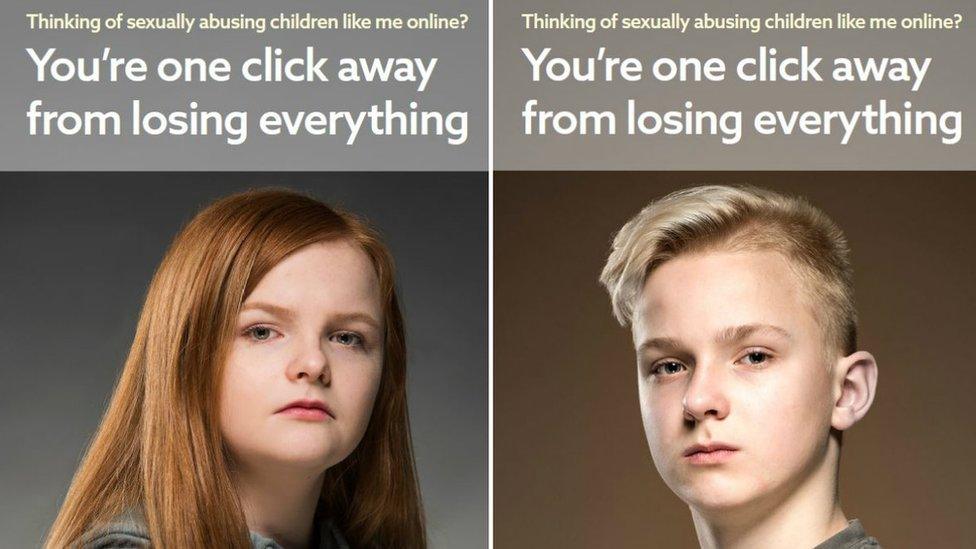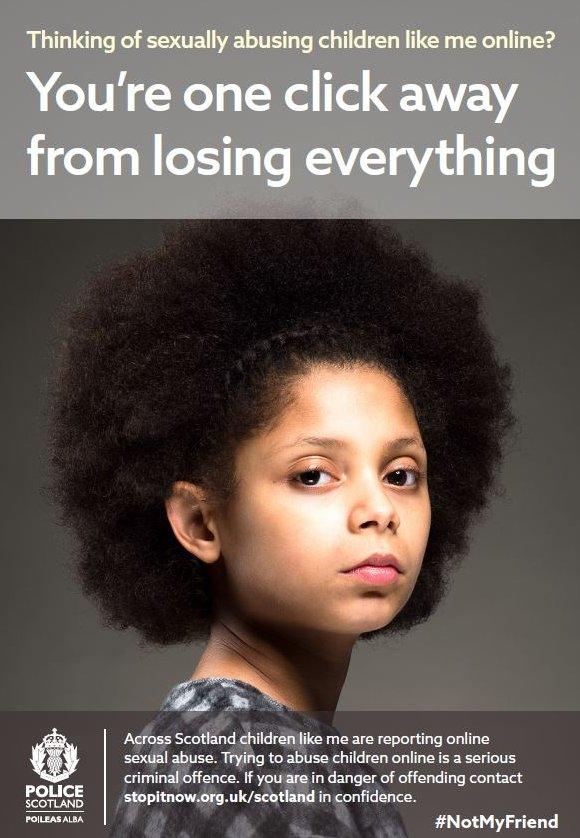Quarter of Scotland's sex offenders abuse children online
- Published

The hard-hitting campaign speaks to potential child sex abusers
Almost a quarter of child abusers on the sex offenders register committed their crimes online, Police Scotland has revealed.
The force released the statistic at the start of a hard-hitting campaign warning abusers they will be found and arrested.
They are now using social media to take their anti-abuse message to the very place the perpetrators operate.
In the campaign, children say: " You're one click away from losing everything."
The campaign warns abusers of the life-changing consequences of their actions, making it clear they will have a lasting impact on not only their victims but also on their families and themselves.
'We will find you'
Assistant Chief Constable Gillian MacDonald helped develop the campaign
She said: "Our message is an extremely strong and powerful one absolutely aimed at perpetrators.
"They often feel anonymous and invisible operating online because they will often be in their own home, having created a fake profile, and they think police won't be able to identify who they are and where they are.
"That's absolutely wrong. We have skilled investigators who operate in the online environment and are very skilled at indentifying perpetrators who are seeking to target children.
"My message to them is please don't be under any illusion - we will find you and we will arrest you."

The campaign contains a message from children under the hashtag "#NotMyFriend" to illustrate how those who groom or manipulate children into controlling situations present themselves as the child's friend at the outset.
Police Scotland is also working with Stop It Now! - an online child sexual abuse prevention organisation.
It manages a confidential helpline designed to help adults with a range of concerns about child sexual abuse, including those with concerns about their own sexual thoughts and behaviours towards children.
A spokesman from NSPCC Scotland said: "Child sexual abuse is increasingly happening online, with the perpetrators often using fake profiles to try and hide who they really are from the young people they ruthlessly target and all those who are working hard to stop them.
"Police Scotland's #NotMyFriend campaign is a timely reminder of the harm their actions can cause; on the lives of their victim, themselves and all those close to them.
"At the NSPCC we want to see law enforcement, government and tech companies coming together to ensure the internet is a hostile place for anyone who seeks to use it to create a cloak of anonymity and then sexually abuse young people."
The campaign also uses personal experiences to highlight the costs to everyone involved, not just the perpetrator.

Consequences: The victim
"During the incident I stopped, my heart dropped, I was shocked.
He deleted the account he was using. That made me think it was only me he had done this to and that no-one else was involved. I never reported it to the police for that reason. I didn't think much could be done to trace the user.
About two years later I received a card through the post from the police. I was shocked, especially when I was told he was doing it to other people. I had a lot of mixed feelings that day, I felt a little guilty too as I hadn't reported it, so he has continued to ruin girls' lives."

Consequences: The Perpetrator
"A couple of days before my birthday, at around eight in the morning, the result of not reaching out for help came to visit me in the clothes of the Police Scotland cyber crime team. My life changed completely in an instant.
If you think you were feeling low before, wait till you have to tell your family or friends, who may have young children, imagine telling your wife or your own children what you have done, wait till you try and find a job, wait until almost everything you do and hold dear and value disappears.
You can't change what you have done in the past but you can change the future before it's too late."



Consequences: The family
They introduced themselves as plain clothed police and explained that they had a search warrant.
'How many times are mistakes made?' I asked an officer. 'I have never known it to happen' he replied with a sad, significant expression. That was when I realised that this was truly happening.
I was utterly ashamed to be driven into the back entrance of the police station and frog marched to the line of people waiting to be processed.
Two policemen interviewed me and they said that my husband was being interviewed in another room and that my son was on his way to Glasgow.
Late afternoon it was confirmed that the images were on my husband's computer and that he had been formally charged. My son was still in the cell next to the one I had been in awaiting his lawyer and was still to make a statement.
My son emerged looking completely traumatised. I had not seen him cry since he was a child.
Two policemen had gone into his busy firm and escorted him off the premises.
We collected a suit for my husband to appear in court the next day. I returned to the house - it was no longer my home and there I spent a sleepless night before going into work pretending to the outside world that nothing had happened but inside I was broken.